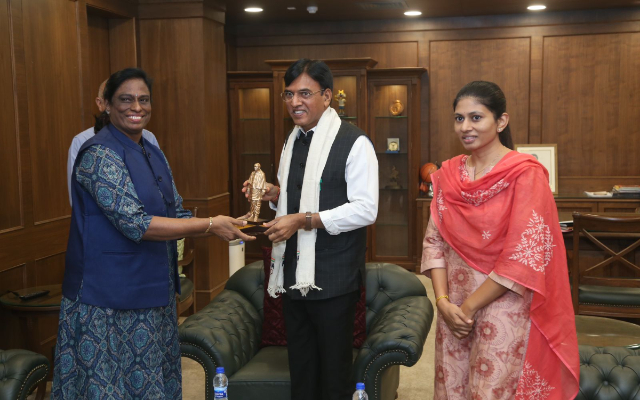
The Draft National Sports Governance Bill, 2024, which has been placed in the public domain by the Ministry of Youth Affairs and Sports for feedback is an honest attempt to promote good governance. It is well-known how multiple national sports federations (NSF) in India have faced governance issues over the years. Add to that corruption, officials wanting to cling on to power forever, and athletes suffering for no fault of theirs, and the draft bill attempts to cover all aspects. Surprisingly, given that the bill has not been read by most people, there is already much negative feedback.
In the first place, Mansukh Mandaviya, the Sports Minister, who has been meeting NSFs, athletes, coaches and even select journalists, has sought feedback on the bill. To those who cry wolf and talk of ‘government interference’, that is bogus. Barring cricket, no sport in India can survive without Central Government support, be it through the Sports Ministry or the Sports Authority of India (SAI).
This piece is an attempt to understand the draft bill. First things first, with athletes running to courts of law for several issues, from selection to being wronged and cases of harassment, the draft bill seeks to set up certain regulatory bodies. Perhaps, this is the biggest plus. It is well known that when Ajay Maken, former Sports Minister, wanted to introduce a Sports Bill in Parliament over 12 years ago, it was tripped.
The current government is serious about a new bill and wants to make good governance in NSFs a top priority. The way the wrestling, gymnastics, archery and football federations have become objects of ridicule needs to be avoided. At the same time, even now, the Equestrian Federation of India, All India Tennis Association, Rowing Federation of India and a few more NSFs are in deep trouble.
There is much sympathy for the athletes, and little for the officials in the sports ecosystem at home. So, if the Draft Sports Bill wants to set up a National Sports Regulatory Body of India (SRBI) and an Appellate Sports Tribunal, it must be welcomed. All this was not part of the National Sports Code 2011, which is the Bible for sports governance at present. The best thing to happen once the draft becomes a bill would be that athletes and officials stop running to courts of law, be it in New Delhi, Kolkata, Mumbai or Chennai. A regulatory body would be able to fast-track complaints.
For the Latest Sports News: Click Here
As for fears of government interference, are they already not running Indian sport? Today, not a single sports federation is clean. Every day, one hears of some mess, and how some rule or the other is being flouted. The SRBI structure, in its final shape, will be important. They will give annual recognition, important to receive funds for sports development, holding camps and more. Not all NSFs are convinced by the Draft Sports Bill, but that is expected. Perhaps, they themselves have not read the fine print.
Take, for example, one important point. At present, there is an age limit of 70 years on office-bearers. Under the proposed new bill, if someone becomes president of an NSF at 69 years and 10 months, he or she can still continue for four years. Where the draft bill is possibly overstepping the crease is in asking affiliated state, and even district, associations at a lower tier to comply with the code. That is indeed troublesome, as has been seen in two cases – EFI and Rowing Federation of India.
For motorsports, which has the FMSCI as its parent body, the structure is not like badminton or shooting. They will have to make wholesale changes. Yet, the FMSCI is also to be counted as an NSF.
Whether cricket (BCCI) will also come under the ambit of the bill is unclear. The BCCI has always tried to tell the world that it is independent and has nothing to do with the Sports Ministry. That is untrue, since it is the Indian cricket team. Any use of ‘India’ gives it a national colour, and the flag features as does the national anthem. It will be interesting to see how the BCCI reacts to this.
At a time when there are so many cases pending in various courts of law, it is good to see that the government wants to set up an Appellate Sports Tribunal (AST) under the bill. Any new draft bill will be met with resistance, but the Government is serious about this. One area where it is silent relates to state Olympic committees. They cannot be isolated, as promotion of sports at a state level involves those units. After all, sport is very much a state subject in India.
Also Read: Indians dig their own grave in numerous ways




